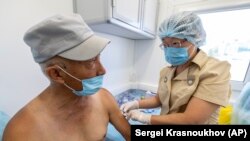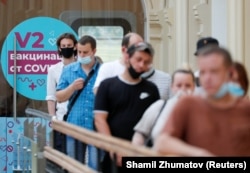Amidst a surge in COVID-19 cases, obligatory vaccinations are becoming Russia’s new norm for combating the virus’ highly contagious Delta strain. But as thousands of adults now line up for vaccines, does the country have enough doses to vaccinate them all?
As of June 28, 18 of Russia’s regions, ranging from Kaliningrad to Sakhalin Island, will have introduced obligatory vaccinations for all or most employees in jobs that involve frequent contact with the public, such as transportation or education. Those who reject the vaccinations can be fired, officials say.
Boosting the vaccination rate is seen as the only way to reduce the frequency of new coronavirus infections, which Russian officials blame on the Delta strain. With 21,665 new COVID-19 cases on June 25, Russia’s coronavirus infection rate now is the highest in Europe and fifth highest in the world (after Brazil, India, Colombia, and Argentina).
To date, nearly 21.5 million people, 14.68 percent of Russia’s adult population, have received at least one vaccine dose, according to official statistics compiled by the data portal Gogov.ru. That falls far below the European rate of nearly 40 percent, according to research compiled by the database Our World in Data.
Although vaccinations are not obligatory nationwide, Deputy Prime Minister Tatyana Golikova believes vaccination can increase to 60 percent of Russia’s population of nearly 146 million by August 2021.
Subtracting the 16.6 million people who have completed vaccination, that would mean roughly 135 million doses of two-dose vaccines to meet the government's target.
Already, regional demand for vaccines has increased five to 10 times since obligatory vaccination went into effect in mid-June, Anna Popova, head of Rospotrebnadzor, the consumer-protection agency supervising Russia’s pandemic regulations, estimated on June 24. But production has not followed suit.
Currently, four Russian-made coronavirus vaccines, all developed by government-controlled research institutes, are in general use.
Sputnik V, the world's first registered COVID-19 vaccine, accounts for 95 percent of the roughly 32 million vaccine doses Russia has produced this year, according to the Ministry of Industry and Trade. Sputnik V’s one-dose sibling, Sputnik Light, became available on June 26, with 2.5 million doses expected by the end of June.
Two other vaccines -- EpiVacCorona (roughly 1.5 million doses produced), and CoviVac (352,000 doses produced) -- trail far behind in 2021 production numbers.
How many vaccine doses exist now to accommodate obligatory vaccinations is unclear. Russian news reports indicate, however, that supplies have not kept up.
Vaccination stopped altogether on June 25 in the Russian Far East’s Khabarovsk Krai after local health officials announced that towns were running out of vaccines. Health Minister Mikhail Murashko subsequently ordered the shipment of 50,000 doses to the region.
St. Petersburg and Moscow have announced shortages of CoviVac, first released in May, while Chechen leader Ramzan Kadyrov complained to Russian President Vladimir Putin on June 23 about a general vaccine shortage. (Chechnya also was promised 50,000 doses.)
Apparently to compensate for such shortages, some medical staff are substituting EpiVacCorona for the better-known Sputnik V, although without necessarily informing patients, the independent news site Novaya Gazeta reported on June 18.
One young resident of the Siberian city of Berezniki, Yana Krepysheva, told Current Time that she planned to go to prosecutors if medical practitioners do not make amends for giving her EpiVacCorona rather than Sputnik V. Other court cases also have been threatened.
Produced by a research institute controlled by Rospotrebnadzor, EpiVacCorona’s reputation suffered in March when 168 vaccine trial participants sent an open letter to the Ministry of Health to flag 18 cases of COVID-19 infection among their group after vaccination with EpiVacCorona, and a lack of virus antibodies among 30 percent of 139 trial participants tested.
Rospotrebnadzor itself, however, claims that the vaccine is 100-percent effective in combating COVID-19.
U.S.-based molecular biologist Olga Matveeva , though, views the vaccine, which was released in February before clinical trials were completed, as “simply ineffective.”
Matveeva contends that fear of Rospotrebnadzor has led to “a conspiracy of silence” about the vaccine among Russian scientists, who sometimes fear losing their jobs if they speak out against it.
The Russian Health Ministry has not acknowledged any grounds to challenge the use of EpiVacCorona as a substitute for exhausted supplies of Sputnik V.
A detailed May 14 report by Reuters cited a lack of qualified personnel and adequate production capacity as among the reasons why Russian manufacturers of Sputnik V cannot monthly produce hundreds of millions of doses, as the Western companies Pfizer and AstraZeneca do.
But the government has not announced an overarching strategy for increasing long-term production of Russia's four COVID-19 vaccines.
Rather than production bottlenecks, presidential spokesman Dmitry Peskov on June 25 blamed shortages on a lack of equipment for storing large quantities of COVID-19 vaccines.
Nonetheless, Peskov asserted that any deficits would be eliminated “in the coming days.”
Industry and Trade Minister Denis Mankurov, who insists that no vaccine shortages exist at all, is feeling optimistic as well.
Starting in July, Russia will produce 30 million doses of Sputnik V per month, Mankurov predicted during a June 18 interview on the government-run TV channel Rossia-24. Pharmaceutical companies involved in this production have not yet confirmed this number.
What percentage of this promised production will go to exports is also unclear. In recent weeks, as obligatory vaccinations began in Russia, Argentina, Belarus, Kazakhstan, and the Philippines have all reported shortages or delayed deliveries of the second dose of Sputnik V.
As yet, the three other Russian vaccines do not have the production volumes to fill in for Sputnik V.
The pharmaceutical company Geopharm, collaborating with the Vector State Research Center of Virology and Biotechnology, expects to produce 5 million doses of EpiVacCorona per month beginning in July, the business daily Kommersant reported. Vector has announced exports of EpiVacCorona to Brazil and Venezuela beginning in the fall.
Meanwhile, the Russian Academy of Sciences’ Chumakov Center has signed a deal with the bio-pharmaceutical company Nanolek to manufacture 5 million doses of CoviVac by the end of the year.
Even so, unless Sputnik V fulfills the government’s production predictions, Russia does not look likely to produce the quantities needed for herd immunity by August.
Epidemiologist Vasily Vlasov predicted in March that, given COVID-19 vaccines' current efficacy, Russia actually would have to vaccinate "more than 80-90 percent" of its population to achieve that goal.
“These are completely unrealizable figures," Vlasov said. "Talking about herd immunity as a goal doesn’t make any sense now …”
-With additional reporting from AP, Gazeta.ru, Interfax, and TASS








